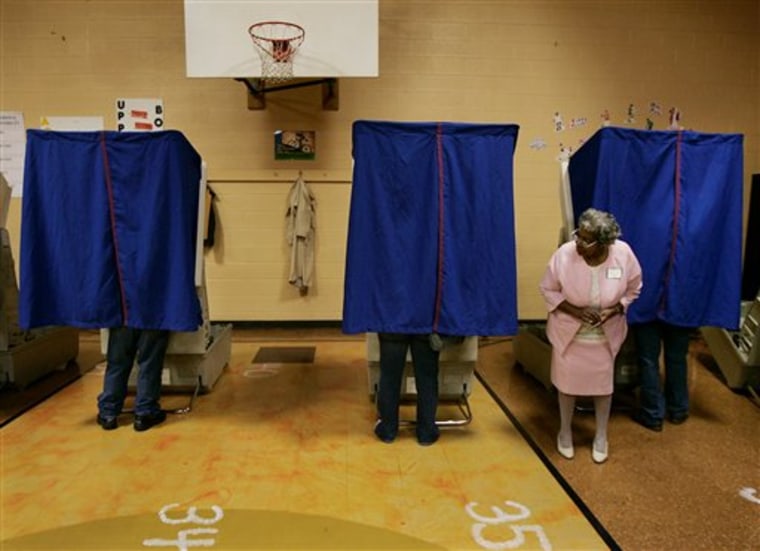In 2000, the presidential election was marred by hanging chads in Florida. Four years later, it was malfunctioning machines in Ohio. With record numbers of voters expected yet again, the fundamental question remains whether the country's embattled election machinery will stand up to the pressure.
This year's unprecedented primary turnout has already exposed cracks in the infrastructure. In Texas, lines stretched for hours and ballots ran out. Voters in Virginia were told to submit slips of paper — which were later disqualified — when ballot deliveries didn't arrive, and overwhelmed poll workers in Washington, D.C., hid electronic machines because they were afraid of the contraptions.
"Right now, election officials probably identify with Sheriff Brody in 'Jaws,' who having seen the great white shark for the first time turns to his fellow passengers and remarks, 'We're gonna need a bigger boat,'" electionline.org director Doug Chapin said in a recent study of voting problems.
Primary turnout broke records across the country — in Delaware and the District of Columbia, the number of voters tripled from 2000; in Florida that figured doubled. The only state with less than 50 percent turnout was New Hampshire, which lost some of its luster as the first primary state when most of the country moved theirs to early in the year.
Though nearly all election officials have taken extra precautions for Tuesday — some have ordered a paper ballot for every registered voter as well as increasing the number of electronic machines — substantial fear remains that polling places won't be able to stand up to millions of voters who want to choose between Democrat Barack Obama, who could become the first black president in American history, and Republican John McCain.
"The ultimate test of democracy is full voter participation," said NAACP president Ben Jealous. "States are not completely grasping what they're in for. In Virginia, the governor won't even agree to printing out additional paper ballots. Even though they started passing out sheets of paper during the primary because they ran out of ballots."
Foreshadowing what could be a litigious ending to this year's election, the NAACP filed a federal lawsuit in Virginia, demanding more electronic machines in minority neighborhoods, and extra paper ballots in case those machines are tied up by record turnout. A judge denied the request Monday following a hearing.
State Republicans had contended that changing voting procedures this late in the game could disadvantage their candidates.
Democratic Gov. Timothy M. Kaine, an Obama supporter, says the added precautions aren't necessary. "We feel confident that we'll be prepared," said gubernatorial spokeswoman Delacey Skinner. "I think that voters who are going to the polls on election day should go early and be prepared for the line, but we're not anticipating any kind of major problems."
Major voting problems disrupted the 2000 presidential election when poorly punched ballots, which resulted in hanging chads, and huge turnouts ignited a volatile, weekslong recount that ended with a ruling by the U.S. Supreme Court. In 2004, lines that stretched 14 hours long and malfunctioning electronic machines created havoc in Ohio, which eventually gave George W. Bush a second term by a margin of about 119,000 votes.
In the past eight years, with money appropriated by Congress, local election officials across the country have changed their voting systems — and changed them again when highly touted electronic voting machines were shown to be vulnerable to hacking and malfunctioning.
On Tuesday, nearly half the country will be casting ballots on a new system, the majority of them using paper cards read by optical scanners.
But it is not the machines that most worry voting advocates. It's the number of people using them.
Already, early voting in states including Florida and Georgia drew crowds that waited for hours and prompted people to bring lawn chairs, and poll workers to hand out bottled water. In Colorado, more than 50 percent of registered voters cast ballots early.
"Suppose Tuesday comes and goes and there's allegations that tens of thousands of people went to vote and were unable to cast a ballot and went home," said Edward B. Foley, a law professor at Ohio State University who specializes in voting litigation. "There's the claim of disenfranchisement but no way to prove it. That would be extraordinarily undesirable."
When it comes to election lawsuits, and there have been scores filed since the 2000 meltdown, the most likely litigious issue in this election is provisional ballots.
They were introduced in 2003 as part of the Help America Vote Act, a far-ranging reform of election systems and voting laws designed to avoid a repeat of Florida's disaster. People at the polls who believe they have been wrongly denied the right to vote — people whose names don't show up on registration lists, for example — have the right to cast provisional ballots.
But rules about counting those ballots sharply differ from state to state, creating confusion and prompting about 20 lawsuits in the past five years, Foley said. In several states, provisional ballots not cast in the proper precinct are thrown out.
With an unprecedented number of voters expected on Tuesday — many of them newly registered, raising the possibility that their names didn't make it onto registration lists — Foley said the provisional ballot may be the hanging chad of 2008.
"They're an insurance policy for voters against wrongful removal from the polls," he said. "But it's a ballot with a question mark on it. Most states have not created uniform rules for counting them."
